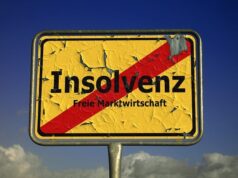
It will be a first in the history of the European Central Bank (ECB): Mario Draghi could be the first ECB president to leave office without ever having raised the key rate. Since 2011, the interest rate has been turned down, now it has been at almost zero for almost two years. A change in monetary policy is not in sight.
The lowering of the key interest rate was the most important instrument in recent years – in addition to the bond purchases at the end of 2018 – in order to stimulate the weakening economy since the financial and economic crisis. Banks were able to lend cheaply because of low interest rates, and people were moved to spend money – it’s not worth investing money. After almost nine years, this monetary policy, which is also attributed the attribute „ultralocker“, will not change much.
ECB chief Draghi, who has just been in office since 2011, had ruled out a rate hike before 2020 just a few days ago. At least beyond the summer, the Euro-Watchers do not want to increase their key interest rates. The reason given is an economic downturn. The ECB President also said that bond purchases could become an option in addition to the zero interest rate policy. But only, „when things go very wrong“. Since the bond purchases began in 2015, the ECB has acquired securities amounting to € 2.6 trillion.
Little scope for change
That „things could go very wrong“ is not expected. However, the margin would also be too small for a change in the ECB’s loose monetary policy. International trade conflicts are slowing down world trade, Chinese economic growth has fallen to its lowest level in nearly three decades last year, and Europe is threatened with a disorderly EU exit from the UK, the consequences of which are unlikely to be appreciated. Also, inflation in the euro area is not developing as expected by the ECB.
So, there is every reason to believe that the ECB will not increase its key interest rates. This calls both critics and advocates on the plan. While some believe that this policy has prevented the disintegration of the euro area in recent years, for critics, as for the former chief economist of the ECB, Jürgen Stark, these measures „unjustifiable“. Neither had it given the deflation danger claimed by the ECB nor was there any risk of inflation in the room, Stark wrote in a guest commentary for the „Neue Zürcher Zeitung“. The price had always been stable, the loose monetary policy so without any basis.
Stark, who served as ECB chief economist from 2006 to 2012, accuses his ex-colleagues of delaying the exit from loose monetary policy – even in times of „economic boom“ – and ultimately missed out. „Or she (ECB, Note) does not want him,“ said the ex-chief economist, who had always spoken out against the purchase of government bonds from troubled states. Under Draghi, according to Stark, the ECB was steered in a direction that would last long beyond the term of office of the Italian. Already in a farewell letter to his colleagues in 2012 Stark wrote that the ECB had extended its mandate to keep the price stable, „in the extreme“.
The politicization of the ECB
Already at the end of last year, Volker Wieland, Professor of Monetary Economics at Goethe University Frankfurt, warned the ECB „to initiate the monetary policy shift too late“. In a guest commentary for Welt am Sonntag, he wrote that inflation could rise faster, risky credits could be forgiven and unproductive investments made. Moreover, the central bank with its instruments should not interfere with the fiscal policies of the member states. A side effect of the loose monetary policy is namely an increasing politicization of the ECB.
The allegation that the ECB has become the largest creditor in the euro area is nothing new. Why Draghi, whose term ends on 31 October 2019, has spoken out in recent years against a tightening of monetary policy is a mystery to many. Some say that if the ECB changes its monetary policy, it will bring unnecessarily distress to heavily indebted countries such as Italy. In addition, the ECB would have tightened its policy a bit by stopping bond purchases, they say. Critics say that Draghi remembers his predecessor, Jean-Claude Trichet, who burnt his fingers towards the end of his term.
In spring 2011 – shortly before the height of the euro debt crisis – the ECB raised the key rate in two steps (April and June) from one to 1.5 percent under Trichet. Experts criticized the move and called for the move to be reversed, as Europe was in economic decline. Only under Draghi was the key rate pushed down. Trichet was also criticized – especially from Germany – for the fact that the ECB went beyond its mandate with buying government bonds. In addition, Trichet gave heads of government of EU crisis countries advice in budget management. For experts a no-go.
First lower penalty rates
If Draghi clears the ECB’s executive chair at the end of October, the next president could certainly tighten monetary policy. Among the possible candidates is, among others, the head of the Dutch central bank, Klaas Knot. He is considered the advocate of a tighter course. In contrast to the President of the German Bundesbank, Jens Weidmann, whose name has already been thrown into the pot, Knot is less strict. However, it is expected that the ECB will first reduce the fine for credit institutions. Currently parked at the ECB 0.4 percent penalty is due for parked money.
Meanwhile, the US Federal Reserve announced on Wednesday an interest break. The key phrase to supply the commercial banks with money remains in the range of 2.25 to 2.5 percent, agreed the currency guardians unanimously. At the same time, the Fed signaled that it would be „patient“ in decisions on future interest rates. Last year, it raised interest rates four times, reacting to the economic boom in the United States.



